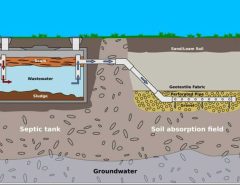There is nothing more annoying than having a blocked drain. Not only can the water drain away slowly, but it can also result in a bad odour in your home. A lot of people delay when they have a blocked drain, hoping that the problem will resolve itself and go away. Perhaps you even try a cheap product you found at your local store. But, the truth is the only thing that is going to help this situation is calling in a drain company as soon as possible. They can assess what the problem is and the best way to resolve the issue.
But, who is going to be responsible for seeking help and paying for unblocking a drain? This is a common question and one where the answer varies depending on the situation. So, let’s take a closer look.
A Property Owner
First of all, in order to find out who is responsible for a blocked drain, you should look at where that drain is located. Normally, when the drain is located within your property boundary, it is going to be up to you to sort out any problems that occur. Therefore, if you are the owner of your home, you will have to contact a drainage expert to find out what the problem is. Understandably, you may be worried about how much it is going to cost to find out what the problem is and find a solution. So, it is recommended that you contact a drainage company as soon as possible. This way, you can sort out the issue before it becomes worse and causes damage to your property.
A Tenant
What happens if you are a tenant and one of your drains becomes blocked? Again, it will be important to establish that this drain belongs to the rented property. Then, the next thing you should do is look at your tenancy agreement. This can outline who is going to be responsible for a blocked drain. Often, the landlord will have the responsibility of dealing with maintenance and repair of the property. In particular, this includes the pipes and drainage system.
But, one thing to be aware of is there are certain situations where the cost of repair could fall on the tenant. For example, if the blockage is in the property, such as a toilet or sink, a tenant may have to pay for a drain company. In particular, this can happen if the blockage is down to something they have done. If you put items down the drain that you should not, this could mean that you are liable for a blockage if it occurs.
What Causes a Blocked Drain?
One thing to know is that a blocked drain can often be avoided. A lot of people do not realise that their habits can lead to a blockage over time. For example, a lot of items can end up going down the kitchen sink and they can lead to a blocked drain. This can include foods such as rice and pasta that expand with water. Over time, combined with other ingredients, it can lead to a blockage where nothing is able to get past.
Another common cause of blocked drains is grease, fat and oils that end up down the sink. Homeowners do not think anything of throwing them away like this since they are liquids. There is the belief that they will simply pass through the system. However, this is not true. In fact, a lot of these liquids solidify and dry up. They can easily stick to the inside of pipes and create a blockage. The best way to get rid of grease, fat and oils is by allowing them to solidify and putting them in the bin.
There are many signs that your drainage system is having problems. Often, they occur before a complete blockage happens. So, if you are able to recognise these signs early, you can call in a professional and have it resolved quickly. Some of the most common signs include a bad odour coming from the drains. This can be down to rotten food or whatever is blocking the drain. Gurgling and loud noises are also something to look out for, as the drain is having to work harder to clear away. The water will also begin draining away slower than normal. It is easy to ignore these signs until they get worse. But, this can lead to a lot of inconvenience.




